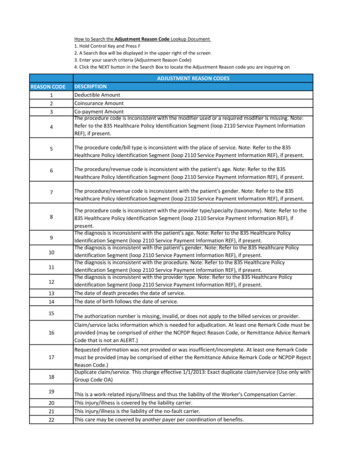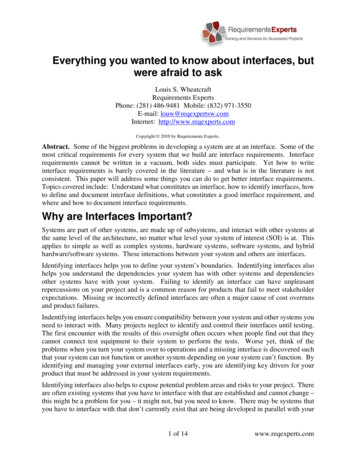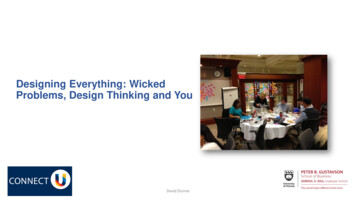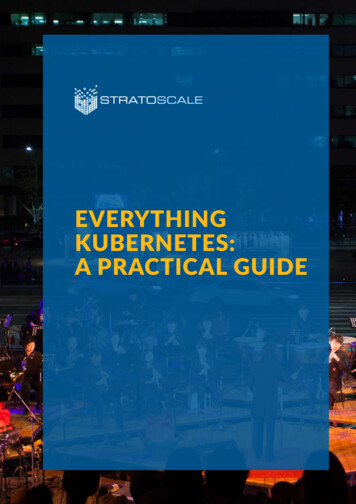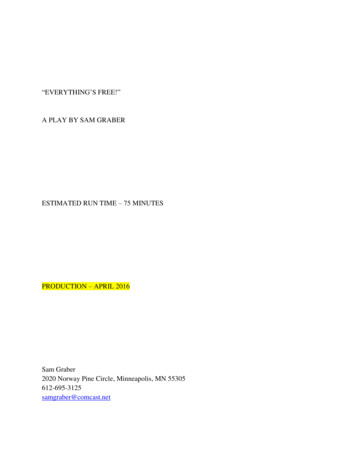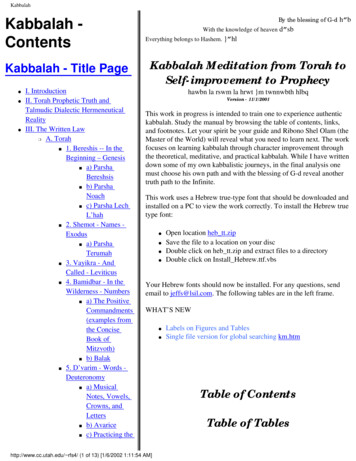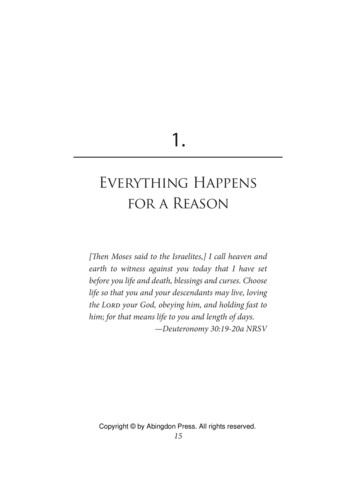
Transcription
1.Everything Happensfor a Reason[Then Moses said to the Israelites,] I call heaven andearth to witness against you today that I have setbefore you life and death, blessings and curses. Chooselife so that you and your descendants may live, lovingthe Lord your God, obeying him, and holding fast tohim; for that means life to you and length of days.—Deuteronomy 30:19-20a NRSVCopyright by Abingdon Press. All rights reserved.159781501813870 INT layout.indd 153/3/16 2:07 PM
Copyright by Abingdon Press. All rights reserved.9781501813870 INT layout.indd 163/3/16 2:07 PM
1.Everything Happensfor a ReasonHas anyone ever said to you, “Everything happensfor a reason”? Most of us have heard that statementfrom someone at some point. Many of us have said itto someone else.The statement is true if, in saying it, we mean thatwe live in a world of cause and effect. Actions createconsequences. Our own choices produce results.A result of choosing to text while driving may be acollision in which someone is injured. In the Scriptureat the beginning of this chapter, Moses is preaching tothe Israelites about cause and effect. Choosing to liveunder God’s law of love for God and neighbor leads tolife and peace for the community.Copyright by Abingdon Press. All rights reserved.179781501813870 INT layout.indd 173/3/16 2:07 PM
Half TruthsUsually, however, when we say “Everything happensfor a reason” we’re not talking about cause and effect.Most often, we’re speaking in response to suffering.When something bad has happened and we’re tryingto help someone through a difficult time, we say “Itwas meant to be.” When someone dies unexpectedly,we hear “It must have been their time” or “It was partof the plan” or “It must have been God’s will.” We seekto console—and others seek to console us—by sayingthat God has a particular purpose for bringing about(or at least allowing) situations in which people suffer.We may assume that while we don’t yet understandwhy it had to happen, all events in our lives unfoldaccording to God’s predetermined and immutableplan. Since God is in charge of everything, whateverhappens—a personal setback, an untimely death, anatural disaster—reflects the will and purposes of God.If we extend this logic, we can arrive at someextremes that seem silly: “God meant for my team to win (or lose) theWorld Series.” “Honey, I’m sorry I forgot your birthday. Itmust have been the will of God.”Copyright by Abingdon Press. All rights reserved.189781501813870 INT layout.indd 183/3/16 2:07 PM
Everything Happens for a ReasonAnd we can get to some very troubling questions: “Why would God will millions of Jews to diein the Holocaust?” “Does God really want little children to die ina school shooting?”So, does everything happen for a reason? At best, thisis a half truth. I’d love to scrub it from the list of thingswe say to comfort people when they are going throughdifficult situations. The notion that God picks winnersand losers in professional sports or the stock market,let alone that God intends car accidents, criminal acts,genocide, or mass murder, surely is worth examining.*The Problem of Personal ResponsibilityIf we examine the notion that everything happensfor a reason, the first problem is that it eliminates theconcept of personal responsibility for our actions. Ifeverything happens according to God’s immutableplan, then whatever I do must have been God’s will.* Much of what I’ve written in this chapter I’ve covered in more detail in mybook, Why? Making Sense of God’s Will (Abingdon Press, 2011). In that bookI also address the questions of intercessory prayer and the specificity ofGod’s will for our lives.Copyright by Abingdon Press. All rights reserved.199781501813870 INT layout.indd 193/3/16 2:07 PM
Half TruthsGod isn’t going to change it. In fact, God must haveneeded and wanted me to do it; otherwise, God wouldnot have let it happen.If I cheat on my wife, it must have been part ofGod’s plan. If my wife and children suffer becauseof my cheating, that must have been God’s will forthem, even if they can’t fathom why God ordained itto happen. If I drink and drive and someone is killedas a result, it must have been the victim’s “time.” Yes,I did a terrible thing, but the devil didn’t make me doit. Instead, God used me to accomplish some greaterpurpose. I cannot be held responsible for my actions;I was only doing what God willed me to do.The Problem of God’s ResponsibilityA second problem with the notion that everythinghappens for a reason is that it makes God responsiblefor everyone’s actions. If God actually intended foreverything to happen, then God is responsible forevery terrible thing that happens in our world. Itwould mean that tragedies do not happen in spite ofGod’s will but because of it.Copyright by Abingdon Press. All rights reserved.209781501813870 INT layout.indd 203/3/16 2:07 PM
Everything Happens for a ReasonConsider how this idea plays out by taking asexamples some news stories I saw the week before Iprepared a sermon on this topic. A two-year-old unzipped his mother’s pursein a Walmart, pulled out a handgun, thoughtit was a toy, pointed it at his mother, andpulled the trigger. It must have been God’splan for her to die and for the toddler to growup and go through life carrying the emotionalburden of having killed his mother. Air Asia Flight 8501 crashed in bad weather,leaving 162 people dead. It must have beeneach of the passengers’ “time.” God causedthe disaster, and the deaths of everyone onboard were a part of God’s plan. The grievingof loved ones left behind, too, was meant tofulfill some part of God’s plan. There was nopoint in searching for the airplane’s blackbox. There was nothing to learn from theflight data recorders, because the crash wasorchestrated by God. Any improvements inairline safety that might have resulted fromlearning and applying lessons from this crashCopyright by Abingdon Press. All rights reserved.219781501813870 INT layout.indd 213/3/16 2:07 PM
Half Truthswould have been pointless, because the nextcrash would also be God’s will, no matterwhat safeguards human beings might design.If this way of thinking is true, then every rape, everymurder, every act of child abuse, every war, every terrible storm or earthquake that claims people’s lives,every child that dies of starvation—all these are partof God’s plan. That is the awful truth we must confront when we buy into the half truth that everythinghappens for a divinely ordained reason.The Problem of Fatalism and IndifferenceA third problem with the notion that everythinghappens for a reason, and that whatever happensis part of God’s plan, is that it leads to fatalism andindifference. A fatalist thinks, “Whatever is going tohappen, will happen. Whatever will be, will be. Weare powerless to change it.”If you’re a committed fatalist, there is no reasonever to wear a seat belt; if you are meant to die in acar accident, you will. If you are not meant to die,you won’t. If you take a fatalistic view, why work out,Copyright by Abingdon Press. All rights reserved.229781501813870 INT layout.indd 223/3/16 2:07 PM
Everything Happens for a Reasoneat healthy foods, or take care of your body? Afterall, when it’s your time, it’s your time. It won’t matterhow much you exercise, or whether you eat baconthree times a day. Diagnosed with cancer? If you’rea fatalist, don’t waste time seeing an oncologist. Toseek treatment would be to resist God’s will; it wasGod, after all, who gave you the cancer in the firstplace. In fact, the entire medical profession, far frombeing God’s instruments of healing, would seem tobe working against God’s plans. (Perhaps it is worthnoting here the relationship between the words fataland fatalism.)Consider how this way of thinking plays outwhen it comes to politics. Many who believe thatwhatever happens must have been the will of Godsuddenly lose this perspective when it comes topolitics. Republicans struggle to believe a Democraticpresident’s election was “the will of God.” Democrats,likewise, struggle with the idea that a Republicanpresident was God’s choice for the office. Do we reallybelieve that everything that happens is God’s will?Or think of sports. Does God really “fix” theoutcome of the Super Bowl, the World Series, and theOlympics?Copyright by Abingdon Press. All rights reserved.239781501813870 INT layout.indd 233/3/16 2:07 PM
Half TruthsIs this really how things work? Is God calling us tobe fatalists?God’s Providence and SovereigntyTheologians speak of God’s purposes and wayof working in the world as the doctrine of divineprovidence. Providence is a noun that is closelyrelated to the verb provide. The term typically refersto God’s governance of the cosmos, including ourworld and everything in it. Christians believe thatGod superintends the universe and oversees whathappens on our planet.Closely linked to providence is another attributeof God: divine sovereignty. The word sovereigntytypically expresses the idea of authority or rule. Inany given place, a sovereign is the highest authority.A sovereign depends on no one else for the power torule. Christians affirm that God’s authority encompasses all creation. As our Jewish brothers and sisterssay regularly in their prayers, God is “King of theuniverse.” Because God is the ultimate authority, allpower and honor, glory and dominion ultimatelybelong to God.Copyright by Abingdon Press. All rights reserved.249781501813870 INT layout.indd 243/3/16 2:07 PM
Everything Happens for a ReasonThough Christians share a belief in God’sprovidence and sovereignty, they ofteninterpret these concepts in very different ways.Though Christians share a belief in God’s providenceand sovereignty, they often interpret these concepts invery different ways. Some tend toward a view of God asmicromanager, involved intimately each day in everydetail of the world’s operation. Others believe thatGod follows a hands-off approach, like an absenteelandlord who created everything and then steppedaway to let the world run itself. Still others believethe truth is somewhere between the two positions.As a result of these varying interpretations, it’s worthtaking some time here to look at the contrasting viewsof how God’s rule is carried out.Calvinism and Theological DeterminismJohn Calvin (1509–1564) was a brilliant lawyer,theologian, and pastor. He was one of the mostimportant figures in the Protestant Reformation. Atage twenty-seven he wrote his book Institutes of theChristian Religion, which not only was an influentialCopyright by Abingdon Press. All rights reserved.259781501813870 INT layout.indd 253/3/16 2:07 PM
Half Truthsbook in his day, but shaped much of Protestant thinking long after his lifetime. Writing in opposition toCatholicism, he outlined Protestant theology as heconceived it.One of the defining emphases of Calvin’s theologyinvolved his understanding of God’s sovereignty.Calvin seemed to believe that for God to besovereign—that is, to be the highest authority and tohave dominion over the universe—then God mustwill and, in some ultimate sense, cause everythingthat happens. If something happens that is not God’swill, Calvin argued, then God does not in fact havedominion over everything. This view is sometimesreferred to as theological determinism.Absolutely everything, Calvin believed, happensby God’s will and command. Had science in Calvin’stime known about human cells and atoms, he wouldhave said that God was directing creation down to thesmallest particles. As Calvin wrote in the Institutes,“No wind ever rises or rages without [God’s] specialcommand.”1 Every aspect of the daily weather, fromthunderstorms to gentle rain and from gales to softbreezes, is decreed by a God who manages everythingto the nth degree.Copyright by Abingdon Press. All rights reserved.269781501813870 INT layout.indd 263/3/16 2:07 PM
Everything Happens for a ReasonIt was natural for Calvin to profess that whateverhappens in people’s lives reflects God’s desire and purpose, and in fact there is some scriptural basis for thisview. In a time before humans understood weatherpatterns, people believed that God withheld the rainor gave it. So, for example, we read in Scripture aboutthe punishing drought in Israel during Elijah’s time.To someone like Elijah, the weather was not aboutatmospheric conditions but about God’s reaction tothe behavior of human beings.I’m not denying the fact that God could cause therain or bring storms. In the case of Elijah’s drought,this was a direct act of God. Yet this particularepisode in Scripture is not meant to teach us abouthow the weather works, but rather, God’s particularjudgment on the sins of the Israelites in the ninthcentury before Christ. Today I believe we’re right toquestion whether the rain, snow, and sunshine arereally God’s doing, or the result of the complex forcesguiding our weather patterns. Our forecasters are notprophets testifying to God’s plans for the weather;instead, they examine satellite images and monitorweather patterns to tell us—most of the time, with aCopyright by Abingdon Press. All rights reserved.279781501813870 INT layout.indd 273/3/16 2:07 PM
Half Truthsdecent degree of accuracy—what our weather will belike tomorrow, the next day, and the next.Consider another example. Calvin believed thata woman’s ability to conceive a child was the resultof God’s will. This clearly was the view of infertilityheld by many in Scripture. They frequently notedthat God “closed up” or “opened” a woman’s womb.Just as Calvin and the Old Testament writers didn’tunderstand the natural forces causing the weather,they didn’t understand human fertility or the unseenphysiological and biochemical factors that affectpregnancy. Yet for Calvin, even if he had understoodthese factors they may have made no difference tohim. He believed that God’s sovereignty requires thateverything, including the minute details of physiologyand biochemistry, is under God’s daily direction.According to this view, even our thoughts andfeelings are governed by God. You might think you’vehad an original idea, but in Calvin’s reality God placedthat idea in your mind. You didn’t decide to take thatjob offer or even take out the garbage; God, guidingyour thoughts, decided those things for you. Thus forCalvin, everything that happens, for good or bad, is“fixed by [God’s] decree.”2Copyright by Abingdon Press. All rights reserved.289781501813870 INT layout.indd 283/3/16 2:07 PM
Everything Happens for a ReasonOne corollary to this view, and the one for whichCalvin is especially known, is a particular focusof theological determinism called predestination.Predestination means that God has predeterminedeverything that happens—that life unfolds accordingto a script God has written before any of us are born.But one of the implications of this belief is that Godhas predetermined, before we are born, whether wewill accept his salvation or be among the damned.According to this view, we have no choice aboutwhether or not we will accept the grace of God. Beforeyou were born, you were predestined to be either amongthe elect or, by not being chosen for election, amongthe damned. If you are among the elect, God’s grace isirresistible to you. No matter how hard you might tryto reject Christ, you will be saved. If you are not one ofthe elect, hell is your certain fate, regardless of howyou live your life or how much you desire salvation.Many Christians struggle with the idea of predestination. The view seems capricious and unjust to manyof us. John Wesley, the founder of Methodism, taughtthat God wills all humanity to be saved. Throughwhat Wesley called prevenient grace, God works inhuman beings to make it possible for us to respond toCopyright by Abingdon Press. All rights reserved.299781501813870 INT layout.indd 293/3/16 2:07 PM
Half TruthsGod’s love and mercy. Some choose to accept God’ssaving grace while others reject it, but at least thissalvation was offered by God to all, and it was God’swill that all would receive it.Through what Wesley called prevenient grace,God works in human beings to make it possiblefor us to respond to God’s love and mercy.Theological determinism—the idea that all thingshappen according to God’s plan and will and thatGod is directing everything—is very appealing tosome. In a world where there is much uncertainty,where doubt and questioning are such a prominentpart of life, one reaction is a retreat toward absolutecertainty. And in a world that seems so out of control,some find it comforting to imagine every detail of lifebeing controlled by the plan and will of God.As noted, Calvin could claim some scripturalsupport for his position, and a number of biblicalauthors clearly saw God’s sovereignty in these terms.Often cited in this connection is Matthew 10:29where Jesus states, “Aren’t two sparrows sold for aCopyright by Abingdon Press. All rights reserved.309781501813870 INT layout.indd 303/3/16 2:07 PM
Everything Happens for a Reasonsmall coin? But not one of them will fall to the groundwithout your Father knowing about it already.” ButGod’s knowledge of something is different fromGod’s command that this or that event happen. Theoverarching message of the Bible does not seem tomake God a micromanager directing everythingaccording to his will. Instead, God is more like aparent who invites his children to make their ownchoices, even knowing they will sometimes makethe wrong ones. We see this picture of God from theopening story of the Bible.God Gives Humanity DominionIn the story of Adam and Eve, God tells them, “Befertile and multiply; fill the earth and master it. Takecharge of the fish of the sea, the birds in the sky, andeverything crawling on the ground” (Genesis 1:28).God creates the cosmos, sets the laws in motion bywhich the universe operates, and then gives humanitydominion, or authority. In other words, God putspeople in charge of what happens on earth. Does thismean that God is not still ultimately in charge? Ofcourse not! God remains sovereign but has given usthe responsibility to rule over this planet on his behalf.Copyright by Abingdon Press. All rights reserved.319781501813870 INT layout.indd 313/3/16 2:07 PM
Half TruthsWe see this same theme in the story of the gardenof Eden. God places a tree in the midst of the gardenand yet forbids the humans to eat from it. Have youever wondered why God put the tree there to beginwith? My own view is that this story is archetypal,and it is meant to teach us that part of being humanis having to make choices between doing good andfollowing God’s path or turning away from it.In the Bible, the very word sin means to miss themark or turn from the right path. The tree illustratesthe idea that being human means having the freedomto choose either the right path—God’s way—or thewrong path. God doesn’t determine which choice wewill make. Much of the biblical story is about humanbeings misusing their freedom and turning away fromGod, and about God’s work to clean up the mess.God has given us freedom to make choices, forbetter or worse. So when we do something wrong, wecan’t blame God. We can’t excuse a poor choice bysaying it was always part of God’s master plan. As theCreation story tells us, we are the ones who exercisedominion on God’s behalf.Copyright by Abingdon Press. All rights reserved.329781501813870 INT layout.indd 323/3/16 2:07 PM
Everything Happens for a ReasonGod has given us freedom to make choices,for better or worse. So when we do somethingwrong, we can’t blame God.Jesus told a parable that illustrates this point. Thestory involves tenants who lease a vineyard andoperate it in a careless way. When the owner sends hisservants to remind the wicked tenants of the owner’ssovereignty and ask them to stop abusing the owner’sinterests, the tenants respond violently. It’s clearwhat Jesus was talking about: human beings are thetenants farming God’s earth. We are tending God’screation. God is the owner; the earth belongs to him.We are free as stewards to make choices, and we areresponsible for those choices.The idea of choice is so very important to ourtheology. Throughout Scripture, God shows humanbeings the right path and warns against pursuing thewrong path. The passage from Deuteronomy thatbegins this chapter is an excellent illustration. Throughhis servant, Moses, God has led the children of Israelout of slavery in Egypt. As they prepare to enter theCopyright by Abingdon Press. All rights reserved.339781501813870 INT layout.indd 333/3/16 2:07 PM
Half TruthsPromised Land, Moses, now an old man nearingdeath, has just recited the Ten Commandments andthe rest of the Law. It’s not the first time the Israeliteshave heard these commandments. But in his sermonto them, Moses reminds them one more time of whatGod expects of his people.Then notice what Moses says next. He implores theIsraelites,I call heaven and earth as my witnesses againstyou right now: I have set life and death, blessingand curse before you. Now choose life—so thatyou and your descendants will live—by lovingthe Lord your God, by obeying his voice, and byclinging to him. That’s how you will survive andlive long on the fertile land.(Deuteronomy 30:19-20a)Speaking on God’s behalf, Moses is showing theIsraelites two paths into the Promised Land. Onepath leads to life; the other leads to death. One pathinvolves a choice to obey and love God, which alsomeans loving the neighbors made in God’s image andseeking to do God’s will in the world; the other pathinvolves a choice to live for ourselves, without regardfor God or anybody else.Copyright by Abingdon Press. All rights reserved.349781501813870 INT layout.indd 343/3/16 2:07 PM
everything happens according to God’s immutable plan, then whatever I do must have been God’s will. * uch of what I’ve written in this chapter I’ve covered in more detail in my M book, Why? Making Sense of God’s Will (Abingdon Press, 2011). In that book I also address th
